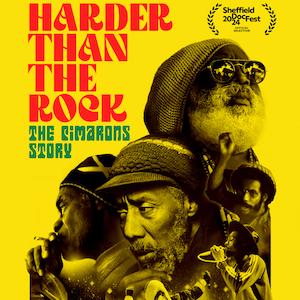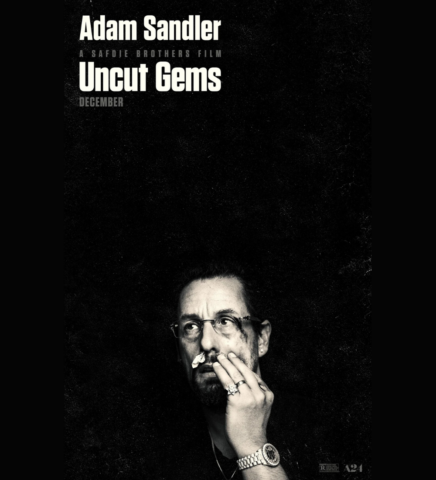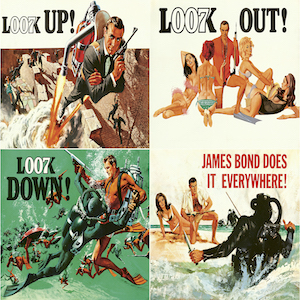Soundtracks to Revolutionary Cinema Movements
By Risikat Owoeye
When we watch a film the soundtrack can be as important as the visual element, playing its part in bringing the film fully to life. Especially when a film has a dark or serious element to it, do you know that music used in a film, for example, narrating a serious subject like a Coup D’etat, may well feature intense and dramatic compositions that heighten the tension of the events? Find out more in Soundtracks to Revolutionary Cinema Movements
Poster for the new Coup D’etat documentary, Johan Grimonprez’s film.
The soundtracks in these films often enhance the political themes, helping to convey the tension and stakes involved in the narratives. Music has a powerful ability to tell stories and convey emotions without words. Each note and rhythm can evoke feelings, paint scenes, and express complex narratives. It’s intriguing to see how music can elevate storytelling, especially in the context of political events and movements.
For example, world-renowned composers like Hans Zimmer, known for his movie soundtracks, often create dramatic and intense music that underscores such events. His work on films like “Inception” and “The Dark Knight” includes powerful and evocative scores.
Music and singing practices highlight different, say in this style of film, political opinions and the ways in which even the meanest citizen could contribute to the creation of revolutionary culture, and they illuminate the tensions between different governments and the unruly populace that were so fundamental to the revolutionary process. A well-crafted score can make scenes more memorable, intensify the drama, and draw the audience deeper into the narrative, making the overall experience much richer and more immersive.
The influence of political movements on music and vice versa is a global phenomenon, and the power of art has been questioned over the years, transcending cultural and geographical boundaries. In various parts of the world, music has been a potent tool for expressing political dissent, fostering solidarity, and driving societal change.
The darkness that comes with forced political change within the cinema gives music an opportunity to express the unexpressive, to shower the watcher with violence that is sometimes too hard to watch; music can express it.
Now looking at the phenomenon say a Coup D’état as is quite fascinating within the world of films and their soundtracks. In essence, a coup is a sudden and often violent overthrow of an existing government by a small group, typically involving the military or a faction within the state apparatus.
In the realm of cinema, Coups have been depicted with varying degrees of intensity and complexity. Soundtracks in Coup films often convey a wide range of emotions, each carefully crafted to enhance the narrative. Primarily, they evoke a sense of tension and suspense, crucial in depicting the uncertainty and danger of a coup. The music often builds a feeling of urgency, highlighting the imminent threat and the high stakes involved.
For instance, in “Syriana,” a film centred on a Coup in a fictional Middle Eastern country. The plot follows Prince Nasir, who aims to reform his nation’s oil industry and strengthen ties with China. His progressive vision threatens the interests of the American oil giant Connex-Killen, prompting covert actions to destabilise his position.
The CIA became involved, assigning veteran operative Bob Barnes to assassinate Prince Nasir to prevent the Coup. As the plot progresses, it exposes the moral and ethical dilemmas of these actions, illustrating the extreme measures powerful entities will take to control valuable resources. The film’s depiction of the coup underscores the complex and often sinister interactions between politics, economics, and global power. The soundtrack for this amazing movie was composed by Alexandre Desplat whose score was nominated for the Golden Globe Award for Best Original Score.
Similarly, “76,” a Nigerian movie, portrays the conspiracy and attempt to overthrow the government during the 1976 Nigerian coup. Ramsey Nouah stars as Captain Joseph Dewa, a young soldier caught in the conspiracy. The film captures the tense political climate following the assassination of General Murtala Mohammed and the subsequent failed Coup attempt. The movie underscores their fight for justice and survival amid the turmoil, vividly depicting the Coup’s effects on both the military and civilian populations.
The personal story of Captain Dewa and Suzy, portrayed by Rita Dominic, intertwines with the larger political events, creating a compelling narrative that encapsulates the essence of that tumultuous period in Nigerian history. The soundtrack for this movie is a fantastic example of how music can elevate a film. The score, composed by Hyacinth Ogbu and featuring songs by artists like Timi Dakolo, captures the intense emotions and historical significance of the events depicted in the film. The music blends traditional Nigerian sounds with modern elements, enhancing the storytelling and bringing the period drama to life in a powerful way.
“The Dogs of War” is a 1980 film based on Frederick Forsyth’s novel. The story follows Jamie Shannon, a battle-hardened mercenary played by Christopher Walken. He is hired by a British industrialist to overthrow the government of a fictional African country called Zangaro, which is rich in valuable platinum deposits.
Shannon and his team conduct a reconnaissance mission in Zangaro, discovering the brutal dictatorship of President Kimba. After being captured and tortured, Shannon escapes and returns to the United States to plan the Coup.
The climax of the film involves the mercenaries’ assault on Zangaro’s capital, leading to intense action sequences and the eventual overthrow of Kimba. The movie explores themes of loyalty, betrayal, and the ethical implications of foreign intervention in a nation’s politics. The soundtrack and atmospheric score enhance the tension and drama, making it a compelling watch for those interested in political thrillers.
A now for funny one. “The Death of Stalin” definitely has elements of a coup. After the death of Stalin his inner circle of ministers and advisors engaged in a frantic power struggle to take control of the Soviet Union. The movie is a dark comedy, so it mixes historical events with satire, making the whole situation both intense and absurd.
It’s a fascinating look at political manoeuvring and the chaos that can follow the death of a powerful leader. The soundtrack for this is composed by Christopher Willis. It brilliantly combines classical music with darkly comedic tones, perfectly complementing the film’s satirical take on historical events. The music really helps to underscore the absurdity and tension of the story.
Moving away again for humour, “Anatomy of a Coup” is a 2002 documentary that also provides a detailed examination of the factors and dynamics involved in a Coup D’état. The film explores various historical coups, analysing the political, social, and psychological elements that contribute to such drastic events.
It looks into the strategic planning and execution of coups, by studying specific case studies, the documentary sheds light on the consequences of coups on national stability and governance, offering a comprehensive understanding of these complex political upheavals.
Then there is “Seven Days in May,” an American political thriller film released in 1964, which delves into the paranoia and fear of the Cold War, centreing on an attempted Coup against a U.S. president. This treaty is opposed by both the military and much of the public, who distrust the Soviets’ commitment.
Burt Lancaster plays a charismatic general who orchestrates a complex plan for a military takeover, while Kirk Douglas portrays his aide, who, despite sympathising with him, feels obligated to thwart the coup. The soundtrack was composed by Jerry Goldsmith. His music adds a layer of tension and drama that perfectly complements the film’s themes of political intrigue and conspiracy.
It is also a great example of how a well-crafted score can elevate the storytelling in a political drama. The film explores themes of conspiracy and political power, common in the works of John Frankenheimer, who previously directed “The Manchurian Candidate” (1962).
So “The Manchurian Candidate” entered everyday language as shorthand for a brainwashed sleeper agent, a person hypnotised to act on command. The story involves an American patrol captured by Chinese communists during the Korean War, with one soldier programmed to become an assassin, later ordered to kill a presidential candidate. The original film starred Frank Sinatra
The movie is based on the 1959 novel by Richard Condon, who likely found it surprising that it was turned into a film featuring big stars like Sinatra, Angela Lansbury, and Laurence Harvey. Even more surprising was that Frankenheimer and Axelrod retained its sharp satire.
The novel was adapted into film twice, once in 1962 with Frank Sinatra and once in 2004 with Denzel Washington. The soundtrack of this film is very great because it has that intense, suspenseful atmosphere that really fits the movie’s theme.
Moving on, to Jack Dwyer, an American engineer, who relocates his family to an unnamed Southeast Asian country for a new job in the movie “No escape“. Shortly after their arrival, the country experiences a violent coup. The rebels overthrow the government and begin targeting foreigners, whom they blame for the country’s problems. The movie is filled with intense and suspenseful moments as the family faces numerous life-threatening situations.
They must rely on their wits and each other to survive the ordeal and find a way to escape the country. The soundtrack for this awesome film was composed by Marco Beltrami and Buck Sanders. Their score really amps up the tension and urgency throughout the film, making the intense moments even more gripping. It’s a great fit for the high-stakes action and suspense of the movie.
And now for “A Very British Coup,” the story follows Harry Perkins, a left-wing politician who unexpectedly becomes the Prime Minister of the United Kingdom. His progressive policies and anti-establishment stance quickly make him a target for various powerful groups, including the media, the intelligence services, and even elements within his own government. As Perkins attempts to implement his reforms, he faces a series of covert operations aimed at undermining his leadership.
The film highlights the intricate and often shadowy mechanisms of political power, exploring themes of democracy, corruption, and the struggle between idealism and ‘realpolitik’. The music in this story helps to heighten the emotional impact of the narrative, making the viewer feel the weight of the conspiracies and the stakes involved.
The newest film about a Coup D’etat is a documentary coming to the UK cinemas in November. This is not just a film that tells a story with voice-over but one that delivers the politics of decolonization in jazz form, replete with virtuosic archival riffs, and historical text in the form of Blue Note album covers and this is a true life event that took place in 1961 where singer Abbey Lincoln and drummer Max Roach storm the UN Security Council to protest the murder of Patrice Lumumba, the prime minister of the newly independent Congo. Sixty protesters, shouting and causing a commotion, clash with unprepared guards as diplomats watch in shock.
The decolonization movement turns the world upside down, bringing a sense of hope. Six months prior, sixteen newly independent African countries joined the United Nations, shifting the majority vote away from the old colonial powers. During the peak of the Cold War, Soviet leader Nikita Khrushchev famously bangs his shoe on his desk at the UN General Assembly in response to the neo-colonial power grab in the Democratic Republic of the Congo. He condemns America’s racial segregation and the UN’s role in Lumumba’s overthrow, calling for immediate global decolonization.
The soundtrack for this documentary was composed by Michael Stearns. His music is known for its ability to create an immersive and evocative atmosphere, which would enhance the dramatic and tense nature of the documentary. The score likely plays a crucial role in conveying the gravity and intensity of the political events depicted in the film.
Soundtracks for Coup D’etat films highlight the tension, chaos, and intensity of political overthrows, deepening the emotional impact and narrative of the story. The soundtrack serves as an emotional guide, drawing the audience into the psychological landscape of the film and making the depiction of the Coup more immersive and impactful. For instance, somber, melancholic tones might underscore the gravity of the situation and the potential loss, while triumphant or intense crescendos can signify pivotal moments of confrontation or resolution.
Overall, soundtracks can convey the emotional turmoil of the characters, reflecting their fear, determination, and moral conflicts.
If you enjoyed reading Soundtracks to Revolutionary Cinema Movements then why not read, The Invisible Art; Scent Brings Pre-Raphaelite Art to Life
Cent magazine London, Be Inspired; Get Involved.





